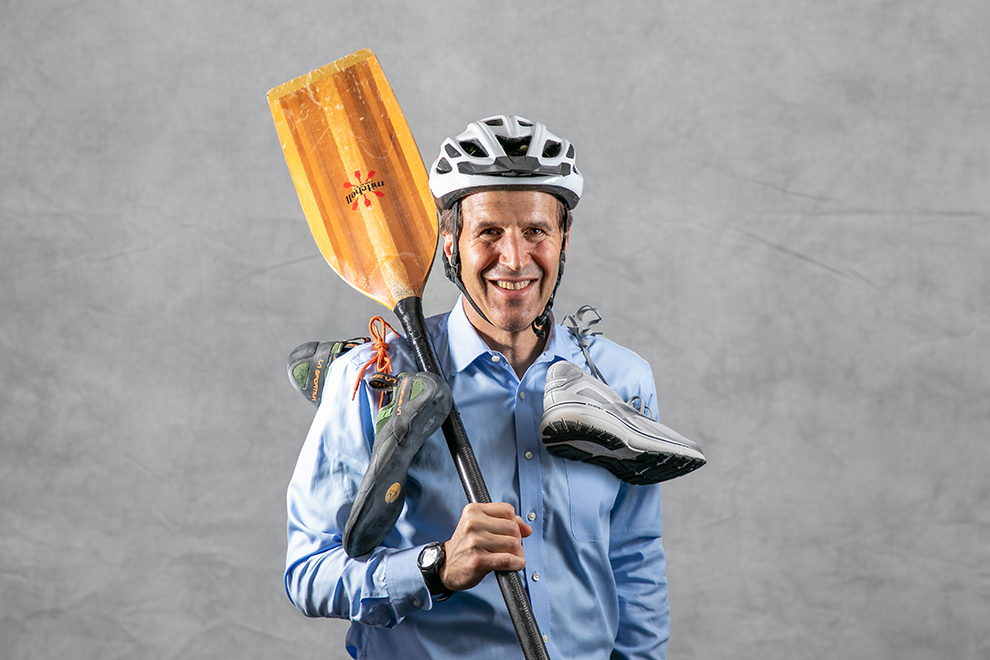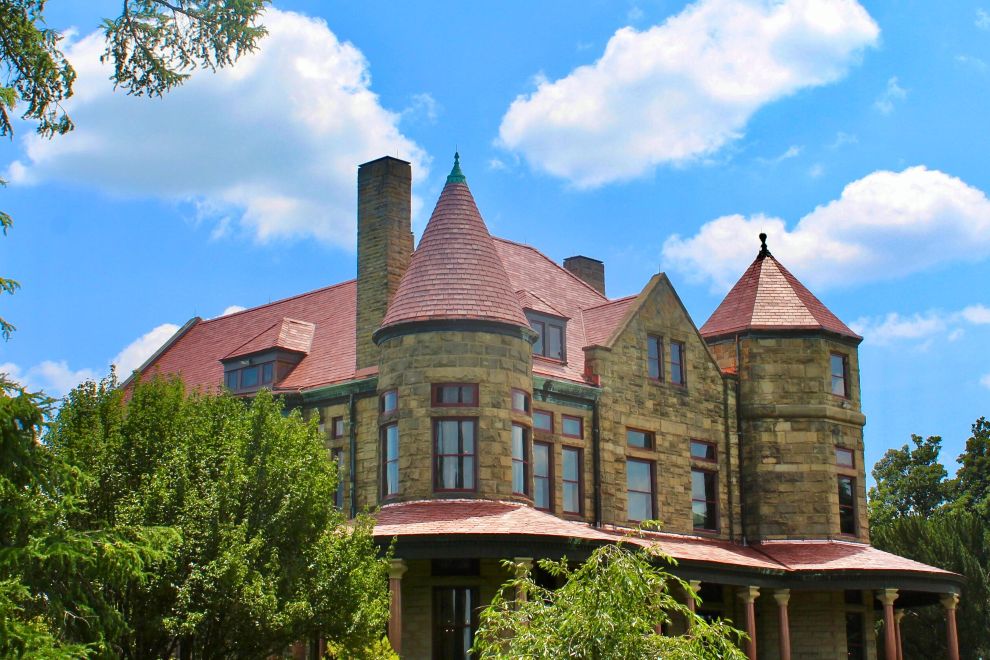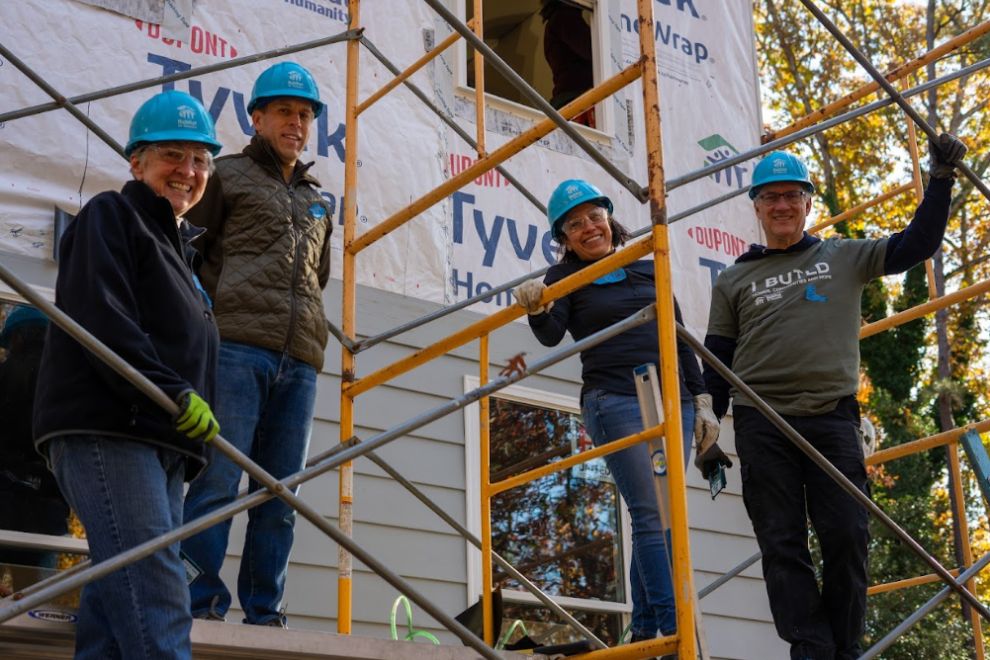In 1993, world champion canoe slalom and Olympic athlete Jon Lugbill became executive director of Sports Backers, a then-fledgling organization with one other staff person and a $137,000 budget.
“When they announced the position, it looked exciting,” he says. “It looked like there was a great board of directors pulled together, and it seemed like a real opportunity where I could jump in and make a difference in the community right away.”
Lugbill jumped in and, for the next 31 years, worked to make Richmond more active through large-scale events, neighborhood programs, and advocacy. This spring, he retires from an award-winning organization with 25 staff members and an $8 million budget. He leaves behind an impressive legacy of accomplishments, including events like Ukrop’s Monument Avenue 10K and Dominion Energy Riverrock and a team of staff and volunteers poised to continue playing a pivotal role in the lives of Richmond families.
The Making of a Champion
Lugbill discovered his first passions, canoeing and kayaking, when he was 9 years old. One of his older brothers had suggested the family travel from their home in Fairfax, Virginia, to West Virginia to watch a kayak race. “Dad took us out there, and they had an inner tube race that we competed in,” Lugbill says. “But we saw all these kayaks, and we begged our dad to try it.”
They tried it, and they liked it. They even convinced their dad to take them on kayaking trips throughout Virginia, Maryland, and West Virginia. In 1975, when Lugbill was about to turn 14, he joined the National Whitewater Canoeing and Kayaking Team and competed continuously for 17 years.
He was coached by Harvard-educated Bill Endicott, who Lugbill says traveled the world to interview coaches of elite runners, swimmers, and other athletes about how they trained. “Bill’s leadership skills, work ethic, and drive to excel has proven to be more valuable to my personal development than I could have ever imagined,” Lugbill said in a 2019 interview with Men’s Journal. “I’m sure the other paddlers from my generation would agree that he had an extremely positive impact on their paddling careers, as well as their life after paddling.”
While in high school, Lugbill trained 10 to 12 times a week, except during football season when he was only able to get out on the water three or four times a week. Still, by the time he finished high school, he had paddled more than 10,000 hours – the amount of time needed to become an expert in something, according to journalist Malcolm Gladwell.
Two weeks after graduation in 1979, Lugbill won his first C1 (single canoe) men’s world championship in canoe slalom, a race that requires an athlete in a closed cockpit canoe to maneuver through a series of gates with a single-bladed paddle. In 1981, he competed in and won the next C1 world championship.
Later that year, Lugbill enrolled in the University of Virginia to study environmental science, occasionally taking time off to train and compete. He won three more C1 world championships in 1983, 1987, and 1989, ending European domination of the sport and beating the previous world record of three individual titles. Lugbill also won seven C1 team gold medals and earned silver at the 1985 championship.
In 1989, Lugbill was named USA Canoe Kayak’s Male Athlete of the Year. That same year, Sports Illustrated described him as the “undaunted king of white-water canoeing.” By that point, he was the only paddler to appear on the cover of a Wheaties box, the ultimate testament to his athletic prowess.

In 1992, Lugbill competed in the Olympics. That was the year slalom canoeing returned to the games after a 20-year hiatus. Lugbill came in fourth place, docked for having hit a gate in his first run. At the time, he was 31 and perhaps past his prime. Sports commentators have argued that Lugbill likely would have medaled had slalom canoeing been part of the 1984 or 1988 Olympics.
“A good case can be made that Jon Lugbill is the greatest American athlete in an Olympic sport to have never won a medal at the Olympics,” reads his bio on the official Olympics website. “He is almost universally acclaimed as the greatest C1 slalom racer of all-time.”
The Making of an Organization
Sports Backers began to germinate in 1991, a year before Lugbill’s Olympic appearance, when local business leaders Bobby Ukrop, Allan Strange, Mike Berry, Bill Flowers, and J.R. Hipple started Greater Richmond Sports Backers. They hosted luncheon speakers, awarded scholarships to high school scholar-athletes, and brainstormed ways to “improve quality of life through sports,” Hipple says. They joined with Metropolitan Richmond Sports, a collaborative effort among government localities to develop sports tourism in the region by bringing in large sporting events.
After seeing an ad for the Sports Backers executive director position, Lugbill decided to apply. When the leaders of the organization interviewed candidates for the position, “Jon was clearly the best person [for the job],” Ukrop says. “He has the fire of a world champion, he can dream big, he loves challenges, and he can put in the work. He wouldn’t ask anyone to do something he wouldn’t do.”
In his early years with Sports Backers, Lugbill helped bring major sporting events to the city, including NCAA men’s soccer championships and the 1994 NCAA women’s basketball championship. Ukrop and the other Sports Backers founders “always aspired for more,” Lugbill says. “So, it was kind of my job to transition the organization as quickly as possible to do more.”
In 1988, Sports Backers took over the Richmond Marathon from the Richmond Times-Dispatch. Though the race initially lost money, Lugbill and his team persisted, and after seven years, it became profitable. This past year, both the Allianz Richmond Marathon and the CarMax Richmond Half Marathon sold out with 6,200 and 10,000 registered runners, respectively.
In 2000, Lugbill and his team created the Monument Avenue 10K after researching similar events like Atlanta’s Peachtree Road Race, one of the largest 10K races in the country. In the first year, the Monument 10K had 2,436 participants, 400 more than needed to break even. Participation grew exponentially – by the fifth year more than 15,200 people participated. This past year, 24,000 people participated in what now ranks as one of the country’s top five largest 10K races.
“That event started to change how we worked with the community. We started to become aggressive about creating events,” Lugbill says.
Sports Backers has continued to add races to its schedule, including the Ashland Half Marathon and 5K, the CarMax Tacky Light Run, Run Richmond 16.19, and the Virginia Credit Union River City Half and 5K.
Lugbill’s signature event is Dominion Energy Riverrock, created in 2009 to show off Richmond’s outdoor resources. He started by trying to bring in existing extreme sports events. When that didn’t work, he researched outdoor events around the country and created something new.
Lugbill knew that kayaking or rock climbing wouldn’t be enough on their own to bring crowds to Brown’s Island, so he built a three-day festival that includes not only kayaking and rock climbing but also music, trail running, mountain biking, and jumping dogs. “People will come if you have it all,” he says. And they have. It’s now one of the country’s largest outdoor sports and music festivals and draws crowds of 100,000 or more.
Sports Backers has also helped make the Richmond community more active in large-scale ways through specialized programs that bring fitness to underserved communities. In 2013, they created Kids Run RVA, a program that offers free before- and after-school programs to help kids get involved in fitness early in life. They rebranded the program in 2023, changing the name to Kids on the Move to reflect an emphasis on physical activity in a variety of forms.
Through the Fitness Warriors program founded in 2014, Sports Backers trains area residents to be professional fitness instructors who go on to provide free classes in neighborhoods throughout metro Richmond that experience higher rates of health issues like diabetes and high blood pressure. Around 2,000 people typically participate each year.
“One of our big motivators is to have the community be healthier, but that’s not what we lead with. We lead with fun,” Lugbill says. “We’ve motivated hundreds of thousands of people to live actively who otherwise wouldn’t have, and the health outcomes are significant.”
The Making of a More Walkable and Bikeable City
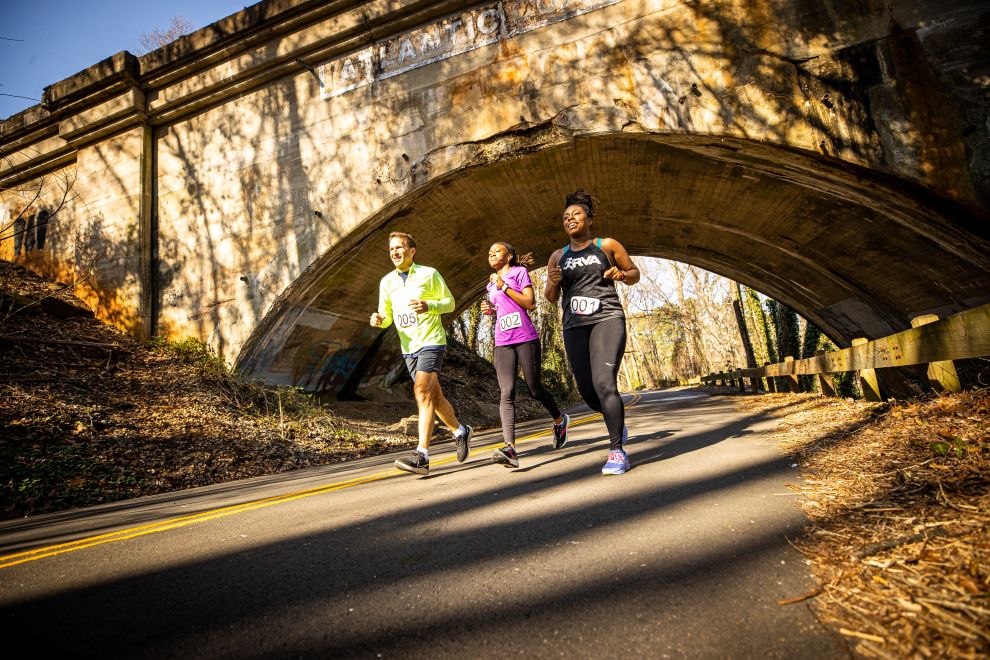
Lugbill and his team recognize that people can lead more active lives if they can walk and bike to work, school, and restaurants. In 2012, Sports Backers created Bike Walk RVA to advocate for bike lanes, sidewalks, and walking trails throughout the region. Their Bike Walk RVA Academy has trained 160 volunteers to advocate for more pedestrian- and bike-friendly infrastructure throughout the Richmond area.
There have been some good wins. Bike Walk RVA won Bicycling Magazine‘s People’s Choice Advocacy Award in 2015. And Lugbill says he’s seen local governments spend 10 times more money on pedestrian and bike infrastructure during his tenure than they had previously.
Several years after creating Bike Walk RVA, Sports Backers started working on the Fall Line, a 43-mile paved trail that’s being built to connect Richmond and surrounding areas. Lugbill and his team researched other cities with extensive trail systems, like Boulder, Colorado, and saw firsthand the impact on residents, many of whom walk or bike to work and school.
The Fall Line trail, expected to be completed in the next 10 years, is a team effort by the Virginia Department of Transportation’s Richmond District Office, the Central Virginia Transportation Authority, Plan RVA, and the Crater Planning District Commission. It will pass through seven localities: Ashland, Hanover County, Henrico County, Richmond, Chesterfield County, Colonial Heights, and Petersburg.
“We think the Fall Line trail will be the spine of our active living network, so that people will be able to walk, run, or bike to destinations that are fun and engaging and find ways to make active transportation part of daily life,” Lugbill says. “It’s taken years to plan, but the impacts can be huge. It can change the way life is lived.”
Sports Backers’ new headquarters will sit along the trail in a former Bank of America on Lakeside Avenue. The building will include meeting spaces and a group fitness studio where the organization can train Fitness Warrior instructors and race training team coaches. “Being on the Fall Line and having such a strong connection cements Sports Backers’ commitment to the trail and all of its future promise,” Lugbill says.
Katherine O’Donnell, president and CEO of Richmond Region Tourism, says that Lugbill’s vision and dedication have left an indelible mark on the Richmond community. “His passion extended beyond sports, championing walkable neighborhoods, protected bike lanes, and the Fall Line trail – projects that will benefit generations to come,” she says. “Jon’s leadership with Sports Backers has inspired countless individuals to get active and embrace our community.”
The Making of a Retiree
As with everything he does, Lugbill is entering this next phase of life prepared. He’s asked retired CEOs and founders for their advice, and he’s reflected on his retirement from his sport. “I think [before retiring from competing] my identity was 100 percent tied to kayaking, and then it became 100 percent tied to Sports Backers,” Lugbill says. “I think I’m pretty comfortable knowing that I have my own identity going forward.”
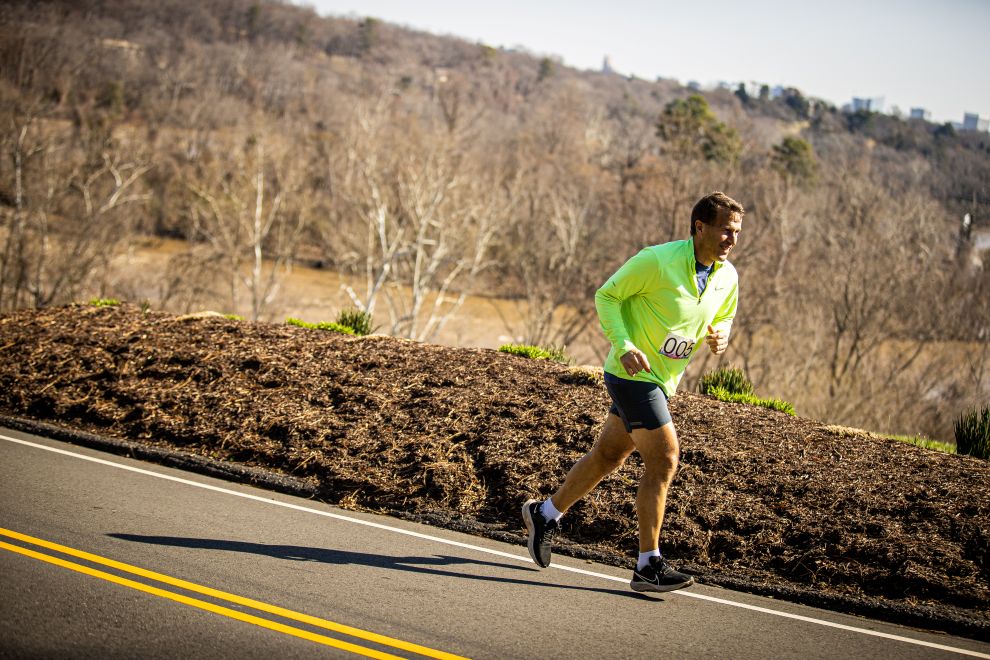
Lugbill still enjoys paddling, running, mountain biking, and rock climbing and is training to run with friends in the Blue Ridge Relay, a 208-mile team race from Grayson Highlands State Park in Virginia to Asheville, North Carolina.
Lugbill’s wife of 40 years, Gillian, is also retiring, so they’re looking forward to spending more time together. Another highlight? Becoming grandparents. “Our older daughter Kelly is having our first grandchild,” he says. “We’re really excited.”
Lugbill can enter this new phase of life knowing that, under his leadership, Sports Backers has gained recognition across the country for making the city more active. Among other accolades, the organization is a four-time winner of the National Association of Sports Commissions’ Member of the Year award.
“We expected great things based on Jon’s character and previous successes,” says Hipple, “but we never could’ve imagined the extraordinary growth and community impact he would have with Sports Backers.”
Lugbill credits his team of staff, volunteers, and advocates for the organization’s many successes. “My legacy isn’t about all the specific wins. It’s about the momentum and movement of hundreds of organizations and entities and hundreds of thousands of people,” Lugbill says. “I hope I’ve helped orchestrate some of that, but at the end of the day, it’s the orchestra that plays the music, not the conductor.”


